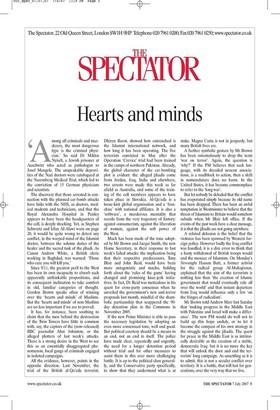Hearts and minds
‘Among all criminals and murderers, the most dangerous type is the criminal physician. So said Dr Miklos Nyiszli, a Jewish prisoner at Auschwitz who acted as pathologist to Josef Mengele. The unspeakable depravities of the Nazi doctors were catalogued at the Nuremberg Medical Trial, which led to the conviction of 15 German physicians and scientists.
The discovery that those arrested in connection with the planned car-bomb attacks have links with the NHS, as doctors, medical students and technicians, and that the Royal Alexandra Hospital in Paisley appears to have been the headquarters of the cell, is deeply shocking. Yet, as Stephen Schwartz and Irfan Al-Alawi warn on page 20, it would be quite wrong to detect any conflict, in the warped mind of the Islamist doctor, between the solemn duties of the healer and the sacred task of the jihadi. As Canon Andrew White, a British cleric working in Baghdad, was warned: 'Those who cure you will kill you.'
Since 9/11, the greatest peril to the West has been its own incapacity to absorb such apparently unthinkable propositions, and its consequent inclination to take comfort in old, familiar categories of thought. Gordon Brown speaks often of winning over the 'hearts and minds' of Muslims. But the 'hearts and minds' of non-Muslims are no less important if we are to prevail.
It has, for instance, been soothing to claim that the men behind the destruction of the Twin Towers have little in common with, say, the captors of the (now-released) BBC journalist Alan Johnston, or the alleged plotters of last week's attacks. There is a strong desire in the West to see this as an essentially disaggregated phenomenon, local gangs of criminals engaged in isolated campaigns.
All the evidence, however, points in the opposite direction. Last November, the trial of the British al-Qa'eda terrorist, Dhiren Barot, showed how entrenched is the Islamist international network, and how long it has been operating. The five terrorists convicted in May after the Operation 'Crevice' trial had been trained in the camps of northern Pakistan. Already, the global character of the car-bombing plot is evident: the alleged jihadis come from Jordan, Iraq, India and elsewhere, two arrests were made this week as far afield as Australia, and some of the training of the cell members appears to have taken place in Slovakia. Al-Qa'eda is a loose-knit global organisation and a 'franchise' with national affiliates. It is also a 'software', a murderous mentality that recoils from the very trajectory of history: against consumerism, against the liberation of women, against the soft power of the West.
Much has been made of the tone adopted by Mr Brown and Jacqui Smith, the new Home Secretary, in their response to last week's failed attacks: the implication being that their respective predecessors, Tony Blair and John Reid, would have been more antagonistic and macho, holding forth about the 'rules of the game' having changed and promising knee-jerk initiatives. In fact, Dr Reid was meticulous in his quest for cross-party consensus when he unveiled the government's new anti-terror proposals last month, mindful of the shambolic partisanship that scuppered the 90day detention plan in the Commons in November 2005.
If the new Prime Minister is able to pass the necessary legislation by adopting an even more consensual tone, well and good. But political courtesy should be a means to an end, not an end in itself. The police have made clear, repeatedly and cogently, the need for a longer detention period without trial and for other measures to assist them in this ever more challenging battle. It is up to the political class generally, and the Conservative party specifically, to show that they understand what is at stake. Magna Carta is not in jeopardy, but many British lives are.
A further symbolic gesture by Mr Brown has been ostentatiously to drop the term 'war on terror'. Again, the question is 'why?' If the PM believes that such language, with its dreaded neocon associations, is a roadblock to action, then a shift in nomenclature does no harm. In the United States, it has become commonplace to refer to the 'long war'.
But let nobody be deluded that the conflict has evaporated simply because its old name has been dropped. There has been an awful temptation in Westminster to believe that the threat of Islamism to Britain would somehow subside when Mr Blair left office. If the events of the past week have a clear message, it is that the jihadis are not going anywhere.
A related delusion is the belief that the violence has been spawned by Western foreign policy. However badly the Iraq conflict was handled, it is a dire error to think that a hasty withdrawal of British troops would end the menace of Islamism. On Monday's Newsnight Hassan Butt, a former activist for the radical group Al-Muhajiroun, explained that the aim of the terrorists is nothing less than `the creation of Islamic government that would eventually rule all over the world' and that instant departure from Iraq would influence only a few 'on the fringes of radicalism'.
Mr Brown told Andrew Marr last Sunday that 'making progress in the Middle East with Palestine and Israel will make a difference'. The new PM would do well not to build up this hope unduly, or to let it become the compass of his own strategy in the struggle against the jihadis. The quest for peace in the Middle East is as intrinsically desirable as the creation of a stable, democratic Iraq: but it is no more the key that will unlock the door and end the terrorists' long campaign. As unsettling as it is to admit, this is not a secular conflict over territory. It is a battle, that will last for generations, over the very way that we live.



















































 Previous page
Previous page